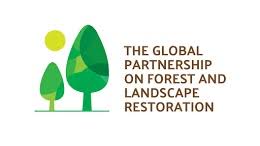Location
The Global Partnership on Forest and Landscape Restoration (GPFLR) is a proactive global network that unites governments, organizations, academic/research institutes, communities and individuals under a common goal: to restore the world’s lost and degraded forests and their surrounding landscapes.
Specifically, the GPFLR responds directly to the Bonn Challenge to restore 150 million hectares of deforested and degraded land by 2020 and 350 million hectares by 2030.
The GPFLR was initiated in 2003 by a small consortium of like-minded organizations and spearheaded by IUCN. Its purpose is to catalyze dynamic, voluntary action through sharing diverse experiences on restoration efforts which deliver tangible benefits to both local communities and nature through a landscape approach, while also fulfilling international commitments on forests.
The GPFLR does this by:
Catalyzing support
Members of the partnership work together to build support for forest and landscape restoration (FLR) at all levels. This includes building awareness and securing the interest of decision-makers and opinion-shapers from government, the private sector, civil society, the media and others. It also involves promoting increased support for FLR in international, regional and national policy frameworks.
Creating knowledge networks to accelerate restoration effort
As practitioners of FLR, we are learning all the time, through experience and from each other. The GPFLR Learning Network provides an important vehicle for that process. Our aim is to raise awareness of real world FLR experiences and make available the tools and knowledge to support practitioners in the field. By connecting our partners and collaborators around the world in an FLR community of practice we are able to spread best practices, build cooperation and exchange new ideas and solutions, saving both time and resources.
Capacity development
Courses and workshops are essential to developing individual and collective capacity with respect to the conservation and restoration of forest landscapes. Our partners organize multiple and varied courses and learning opportunities related to FLR all over the world and online.
We believe that ideas transform landscapes
Through active engagement, collaboration and the sharing of ideas and information, GPFLR promotes an integrated, cross-sectoral approach to restoration that seeks to ensure that forests and the functions and values they represent are effectively re-established, conserved and used to enable sustainable livelihoods and ecological integrity for the future.
The GPFLR does not seek to establish a parallel policy process or duplicate the efforts of others, but rather pursues and creates positive synergies between existing activities, projects, processes and institutions to encourage and reinforce the contribution of each.
Members:
Resources
Displaying 16 - 20 of 23Certifying ecosystem services to restore forests and water supplies in Chile
A pilot project in Chile explores how to ensure that farmers are properly rewarded for managing their land and livestock in ways that safeguard supplies of clean drinking water to users further downstream.*
A World of Opportunity
More than two billion hectares of the world’s deforested and degraded landscapes are likely to offer potential for restoration — a vast opportunity to reduce poverty, improve food security, reduce climate change, and conserve biodiversity
A World of Opportunity
More than two billion hectares of the world’s deforested and degraded landscapes are likely to offer potential for restoration — a vast opportunity to reduce poverty, improve food security, reduce climate change, and conserve biodiversity
A World of Opportunity
More than two billion hectares of the world’s deforested and degraded landscapes are likely to offer potential for restoration — a vast opportunity to reduce poverty, improve food security, reduce climate change, and conserve biodiversity
A World of Opportunity
More than two billion hectares of the world’s deforested and degraded landscapes are likely to offer potential for restoration — a vast opportunity to reduce poverty, improve food security, reduce climate change, and conserve biodiversity



